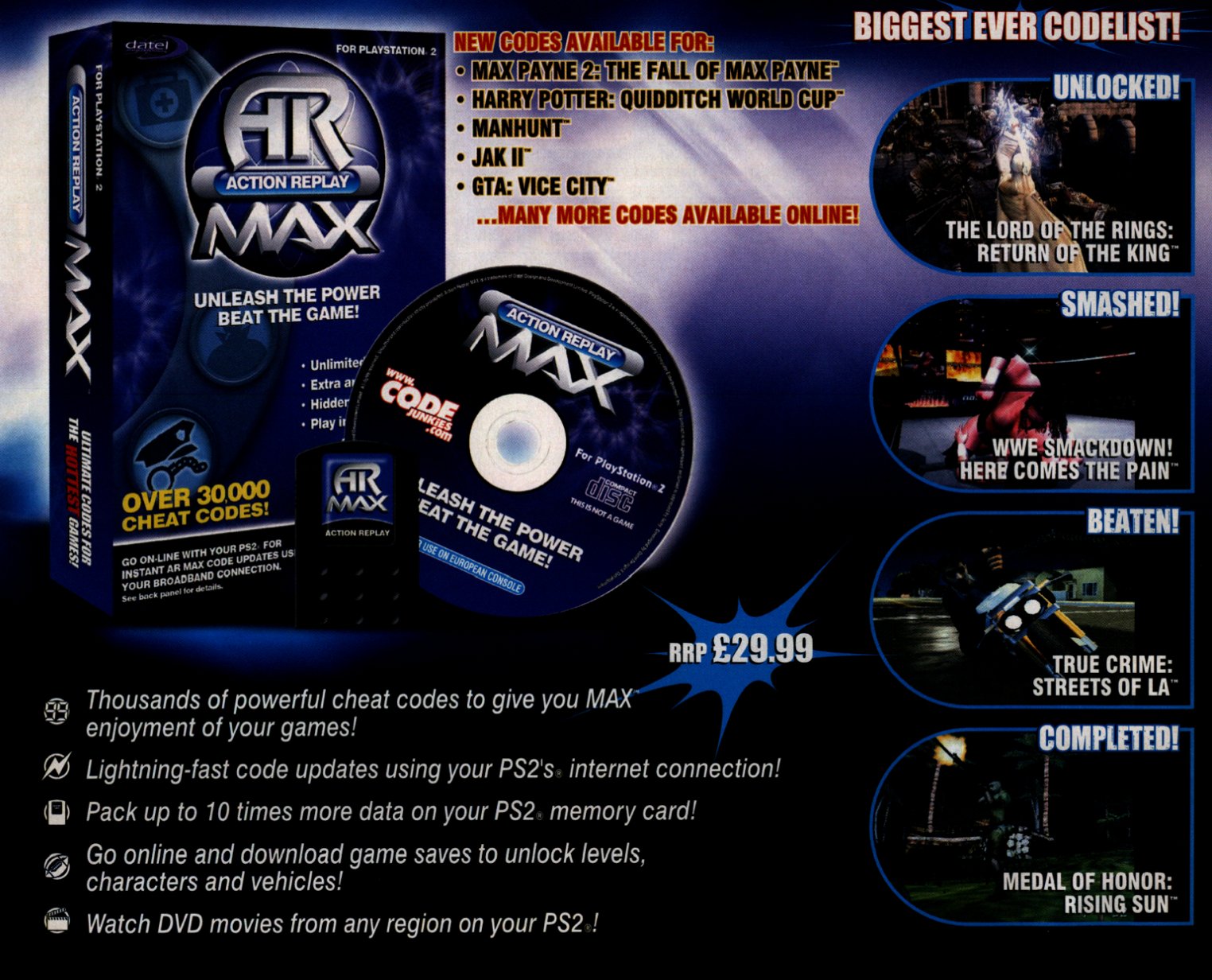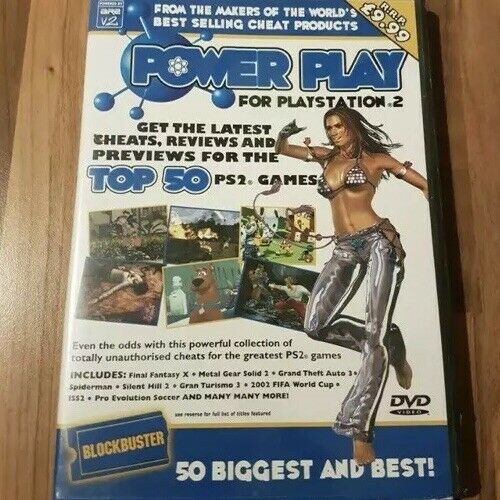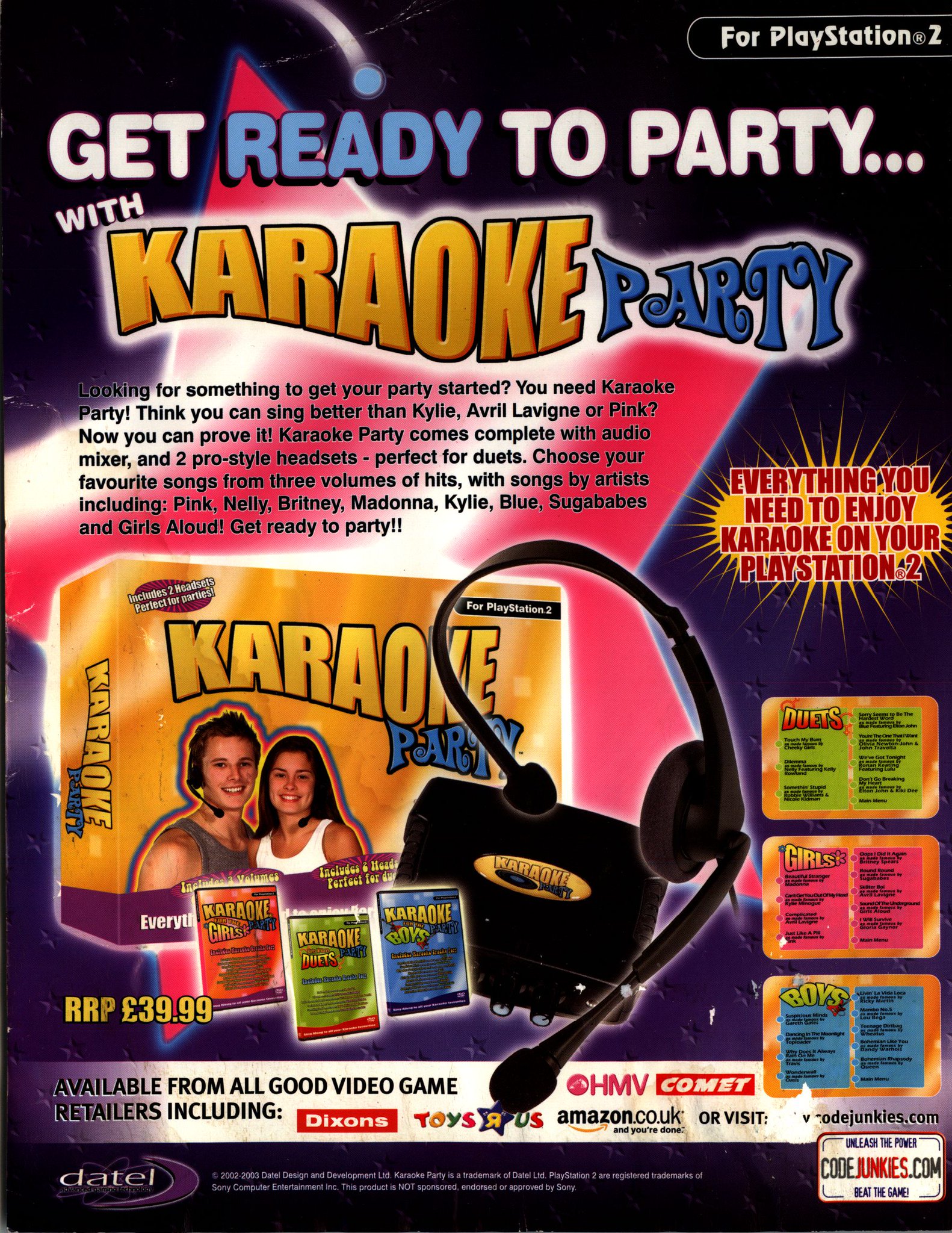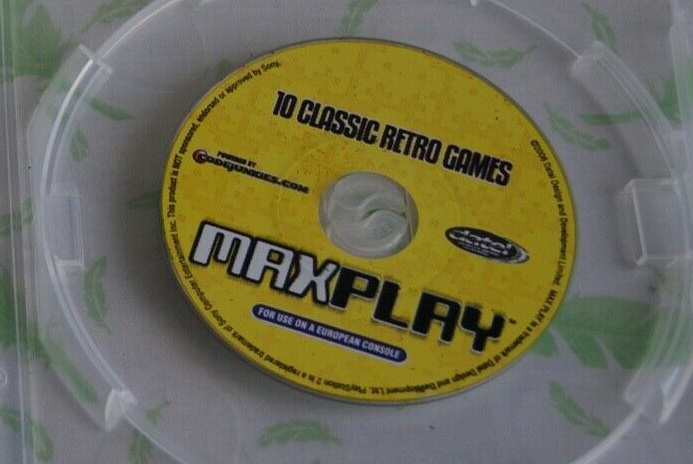
Datel Design & Development Ltd., commonly known as Datel, was founded in 1980.
They are known for producing unlicenced video game peripherals, cheat devices, homebrew enablers and other gaming accessories much to the annoyance of console manufacturers.
They are one of the few companies who know how to press disks that run on PS1, PS2 and GameCube without using an official disc pressing plant.
This page is an extension of our post on twitter:
Let us take a moment to appreciate the work Datel did 20 years ago, reverse engineering and developing their own playable unofficial PS2 DVD discs which contained the watermark and decryption key required to boot code which could not be done with a consumer DVD burner. A 🧵… pic.twitter.com/CP0NQORwwp
— 🕹 RetroReversing - Reverse Retro Games 🕹 (@RetroReversing) January 4, 2022
Infinite cheat codes, save states, memory monitoring, slow motion, and more! This 1993 ISA card version of the Datel Pro Action Replay for DOS computers is packed with odd features. Check it out in this episode of LGR Oddware:
The Action Replay for the Super Nintendo wasn’t just a cheat cartridge, it also allow you to play games from other regions!
Before the Pro Action Replay was released for the N64 Datel decided to release a similar product but instead of allowing memory editing via cheat codes it had a few built in games and would write to the SRAM (Battery backed up save data inside the cartridge). So for example if you plugged in Mario 64 it would edit the save data to give you all the stars and 100% completion. Not as useful as Action Replay as it pretty much completes the game for you, hence the name “Game Killer”.
One cool feature was that the cartridge has a card slot on it for “Killer cards” which were supposed to be cards that add support for other games but sadly none were ever released. This would be a cool reversing project to see if anyone can implement a working card for the Game Killer!
For more information on the Game Killer and the 6 in built games: http://www.nesworld.com/article.php?system=n64&data=n64-gamekiller
Action Replay was released for the Game Boy with a unique fold over design to avoid the game sticking out too much from the top of the device.
You can turn your Game Boy into a PDA with Datel’s “SmartCom” cartridge!
A few of the features include:
It seems very similar to the “WorldPort” but without the email sending functionality.
Send and receive emails on your Game Boy with World Port! It comes with a cable that goes from the cartridge directly into any UK phone socket and you get a free email address. However you need to pay per email which comes in the form of top-up cards you need to buy separately.
Datel released a series of 10 Game Boy Color games completely unlicenced by Nintendo that they called “Rocket Games”.
The 8 games that were released are below:
The Rocket Games were also provided free as part of the Playstation 2 “GameStudio” product which was a Game Boy player for the PS2.
Also one of the games was given away for free with every copy of the UK Magazine GBX issue 11 (last issue before it became G-Force), it advertises Karate Joe but just calls them Rocket Games so presumably it could have been any of them.
Datel were one of the only companies releasing cheat devices for the Game Boy Color, which were incredibly popular thanks to supporting the Pokemon Gold & Silver games!
It contains a code generator to create your own codes (think of a limited version of Cheat Engine) along with a save state feature they called “freezing”.
There was also a special Pokemon Crystal version released in a crystal-like colour, presumably it can use the same codes as the original but probably just has the Pokemon Crystal codes built in instead of having to type them in manually:
I can’t believe this exists but a wearable vest that rumbles in certain GBA games to make it more “immersive”.
Datel also released a version of their Action Replay line of cheat cartridges for the Game Boy Advance as can be seen in the Advertisement below:
A Prototype version was shown in the UK Magazine GBX issue 2:
The X-Port GBX allows you to upload and download saves from your GBA cartridges to allow you to share saves with friends or download saves (sometimes with cheats) from the internet.
Of course they are most famous of their Action Replay (AR) cheat devices, which would have never have received approval from Sony. Modifying memory in the way AR does would be too much of a security risk in terms of piracy/exploits.

However unlike cartridge based versions it didn’t have the Code Creation capability and thus you were reliant on the codes created by the “CodeJunkies” team. You could get these codes either on the website or use the #PS2 modem to connect to the servers, that was a nice touch!

But it didn’t stop there, the ability to print unofficial PS2 Discs was unique to Datel and thus they could sell products without giving a cut to Sony. So it was cheap for Datel to bring products to market, which allowed them to do cheaper per-game equivalents of Action Replay…
There were many of these released for a third of the price of AR. However I believe the standard AR could do all the same cheats and would work out cheaper in the long run if you wanted to cheat in more than 3 games.
One of the best examples is when they used their technology to add official team names into PES3 which was not allowed to use the official FIFA names. AFAIK it was not possible to do with with just AR codes/saves so this product was required.
If you look at the Max Payne version, it is releasing the same day as the retail game which suggests Datel seem to have had early access to the final games before their release date. Other region versions wouldn’t have all the same codes as they would have been recompiled…
One possibility is through their magazine subsidiary known as “Thin Ice Media” which published 3 retail magazines in the UK: GBX, G-force and PSi2. But would publishers really send preview copies to these magazines which were basically used as an advertising channel for Datel?
Although to be fair their magazines went on to be fairly successful with PSi2 having at least 38 issues (not sure if issue 39 exists or not). You see they had one advantage over the competition: the ability to burn playable PS2 cheat discs…
Sony only allowed their Official magazine to have a playable demo disc attached to the front cover, so for unoffical magazines to compete they just included a standard DVD with Game Trailers. This gave Datel magazines a unique Selling Point in the market.
The cheap PS2 DVD creation meant that Datel could allow companies like Blockbuster to cheaply give their customers playable PS2 content while also advertising their Action Replay product. For example PowerPlay!

Even although Action Replay V2/Max has the ability to play DVDs from any region, Datel decided to sell just that feature for half the price of AR and marketed it towards movie and anime fans.

Side note: Action Replay was published by Karat in Japan and even had Potato Chips/Crisps to go along with the product.. ok back to the topic at hand..

But they didn’t just create standalone subsets of Action Replay functionality they also made entirely new software such as Karaoke Party! Which came with very popular pop songs at the time. I wonder did they license the music but not the game? Or was it used without permission?

In a similar vein comes Dance Master, which was basically just a Dance Mat accessory that can work with any PS2 dancing game, but unlike competitors Datel could include its own unlicensed “Dance Work Out Game” which must have given it an edge over other 3rd party Dance Mats.
Another is eyeMax which builds of the craze that was the eyeToy and turns it into a video messaging service where you can create short video content to share with friends or the “global community”. It could have been the TikTok of its day, just a shame it wasn’t very well known…
They also released their own memory cards with the rather useful functionality of being able to back them up to your PC and share them online, or download save files from other users. Then there was their compression technology which claims up to 10x more space for saves…
Another product related to Memory Cards was the X-Drive, which allowed users to use actual Zip disks for game saves, if Zip disks were cheaper this could have been a very popular product…

But what else did they do with the Memory Card hardware? How about Game Studio a Game Boy Color emulator! The glorious sound is a complete lie as it has a very annoying hissing sound, but at least it is better than the version for the PS1 that just played a random annoying song…

Datel had the technology to produce unofficial PS2 discs and really made the most out of it apart from one area… games. There was no big unlicensed hits like CodeMasters Micro Machines was for the NES. The closest was called MaxPlay: 10 retro games like Space Invaders/Jetpack

CodeJunkies is still going today and have a few cheat devices for sale such as for 3DS and the PS2 version of Action Replay is under their Retro section but it has been sold out for a while, which begs the question: Do they still have the ability to create more PS2 Discs?
It is a shame that they never managed to figure out the #PS3 or PS4 Disc format as an Action Replay disc for those consoles would have been useful. Presumably the security of the Blu-ray Discs and upgradability of firmwares made it almost impossible to sell unofficial discs.
I would love to know how Datel technology was developed and ideally in future I would love to see Physical PS2 Homebrew or re-releases like we have seen for cartridge based consoles in recent years such as from Limited Run Games.
Datel also has the technology to create GameCube discs and created a version of Max Play for the Nintendo GameCube with the game 10 retro games as the PS2 version.

An 8MB GameCube Memory Card that allows loading homebrew applications without any modifications of the hardware 1! The Memory Card connects to a PC via a USB cable allowing easy loading of files onto the card.
The Dolphin website has an excellent article on how they managed to get the unlicensed Datel games to run in thier emulator. Dolphin Emulator - Datel: Unlicensed Product Showcase
The biggest hurdle of getting these games to run in Dolphin has nothing to do with the emulator whatsoever. To get to that point, the title has to be dumped so Dolphin can read it. The problem is that most Datel products have discs filled with mostly garbage that will error out on any conventional dumper you throw at them. Next, these titles don’t boot up in Dolphin without a few settings usually reserved for homebrew. They absolutely need the GameCube BIOS because the software abuses part of the BIOS in order to boot up and then use its exception handlers. LLE audio is also required or else they’ll crash spectacularly.
It would be really interesting to find out and document what bugs in the BIOS these games abuse. Also it would be good to know why the garbage data causes most dumpers to fail and how it can be solved.
Read all about Datel Action Replay Professional (N64) in this s...